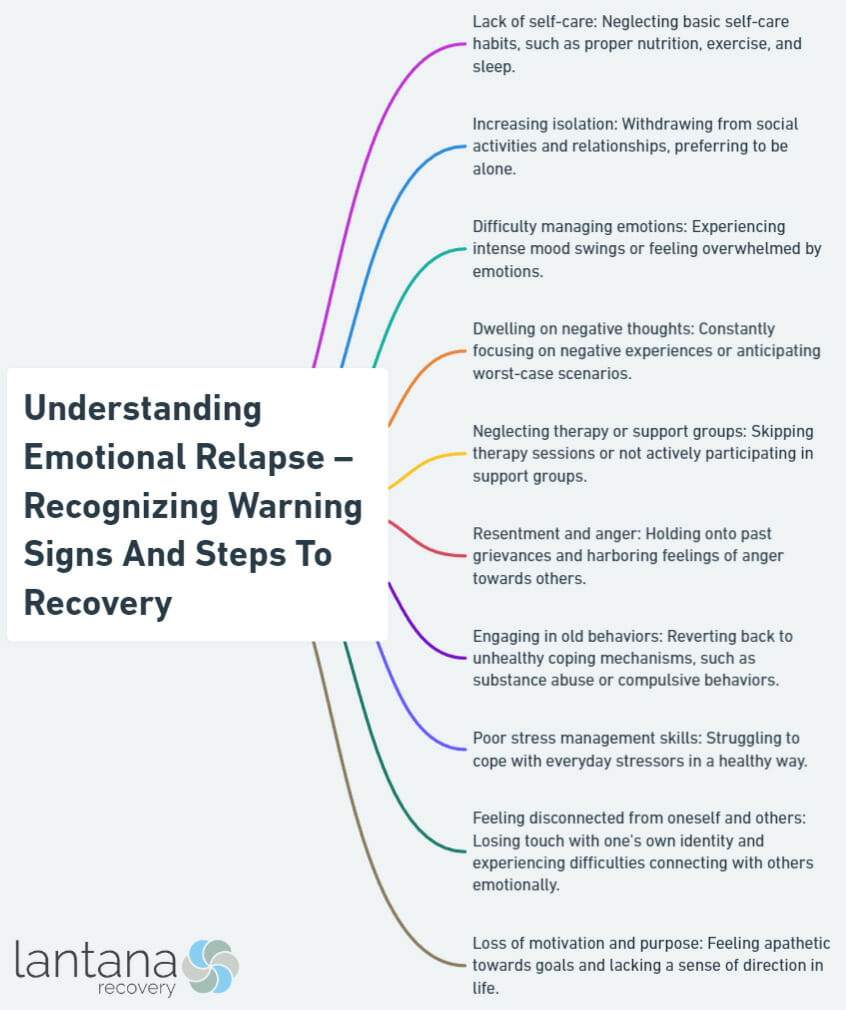Have you ever wondered why, even after completing treatment for substance abuse, many individuals still experience a relapse? The answer lies in understanding emotional relapse, the first and often overlooked stage in the relapse process. Recognizing the early warning signs of emotional relapse and taking action to prevent its progression can make all the difference in maintaining sobriety. Let’s delve into this critical yet often misunderstood aspect of the recovery journey.
Key Takeaways
- Emotional relapse is the initial stage of relapse characterized by refusal to express emotions, neglecting mental and physical health, mood swings, changes in sleeping habits.
- Recognizing personal emotional triggers and implementing effective coping strategies are essential for preventing emotional relapse and achieving a healthier recovery journey.
- Exploring various treatment options such as therapy, medication or holistic approaches can help manage emotional relapse & ensure lasting recovery.
Defining Emotional Relapse

Emotional relapse is the initial stage of the three stages of relapse, where individuals might not be consciously considering drug or alcohol use, but their emotions and behaviors could be leading them toward potential relapses. Recognizing the early warning signs and implementing appropriate relapse prevention strategies necessitates a clear understanding of the differences between emotional, mental, and physical relapse as well as why and how many people relapse after rehab. During the emotional relapse stage, individuals might experience:
- Refusal to express their emotions
- Neglect of their mental and physical health
- Mood swings
- Poor self-care
- Changes in sleeping habits
Recognizing these signs can help prevent the progression from emotional to mental relapse, where the risk of reverting to substance abuse, including alcohol abuse, increases. Fundamentally, early intervention in emotional relapse can break the vicious cycle of multiple relapses.
The objective of relapse prevention is to assist individuals in identifying the initial signs of relapse, including emotional and mental stages, before reaching the third and final stage, which is physical relapse. Being able to recognize these stages and intervene early can lead to a higher success rate in maintaining sobriety.
The Role of Emotions in Relapse
Negative emotions, such as anger, fear, and sadness, can play a significant role in triggering a relapse. Hence, acknowledging and addressing these emotions is of paramount importance during the recovery process after learning about what relapse is. Some warning signs of emotional relapse may include:
- Suppressing emotions
- Isolating oneself from others
- Neglecting self-care
- Experiencing mood swings or emotional instability
Constructing a support system, incorporating mindfulness and introspection, and engaging in beneficial activities can be effective in preventing emotional relapse. Recognizing signs of depression and addressing emotional issues can help mitigate this risk and prevent relapse. Effective emotion management and acknowledgment can help individuals prevent the onset of emotional relapse, thereby assuring a more successful recovery process.
Difference Between Emotional and Mental Relapse
While emotional relapse is characterized by emotions such as anger, fear, and sadness, mental relapse involves an internal conflict where the individual is highly susceptible to physical relapse. The progression from emotional to mental relapse often results from sustained inadequate self-care. Preventing escalation to mental relapse requires addressing emotional issues and implementing effective coping strategies.
Occasional, fleeting thoughts of using substances are common in the early stages of recovery and differ from mental relapse, which is characterized by an internal battle between the desire to use and the desire to abstain. Some strategies that can help manage mental relapse and ultimately prevent physical relapse include:
- Identifying triggers
- Building a support system
- Exercising mindfulness and introspection
- Seeking professional assistance from experts at an institution like Lantana Recovery
Understanding the distinctions between emotional and mental relapse stages enables individuals to recognize their unique characteristics and take appropriate action to prevent a full-blown relapse.
Warning Signs of Emotional Relapse

It’s of utmost importance for individuals to recognize the warning signs of relapse, as it empowers them to take action before the situation deteriorates. Common indicators of emotional relapse include mood fluctuations, neglecting personal care, and alterations in sleep patterns. Some other signs are suppressing emotions, withdrawing from social activities, abstaining from attending meetings, focusing on others, and having inadequate dietary and sleeping habits.
The HALT checklist, which stands for Hunger, Anger, Loneliness, and Tiredness, is a useful tool for recognizing basic needs that require daily attention and can help prevent emotional relapse. Attending to these needs and maintaining overall well-being can effectively mitigate the risk of relapse for individuals.
Being aware of these warning signs and taking appropriate action, such as improving self-care and seeking support, can play a significant role in preventing emotional relapse and ensuring long-term recovery.
Recognizing Personal Triggers
Effectively managing personal emotional triggers and preventing emotional relapse requires their identification. By recognizing these triggers, individuals can devise plans to address them. The HALT acronym stands for:
- Hunger
- Anger
- Loneliness
- Tiredness
Can serve as a reminder of the potential consequences of inadequate self-care and the importance of addressing these basic needs.
Developing strategies to manage personal triggers and emotional responses can play a significant role in preventing emotional relapse. For example, individuals might benefit from engaging in regular self-care practices, such as exercise, nutrition, and stress management, to address their emotional triggers and maintain a balanced emotional state.
Recognizing personal emotional triggers and implementing effective coping mechanisms can not only help avoid emotional relapse but also contribute to a healthier and more fulfilling recovery journey.
The Impact of Stress on Emotional Relapse
Stress can have a significant impact on emotional relapse, as it often induces negative emotions and behaviors that contribute to the relapse process. For individuals who have previously used drugs or alcohol to cope with stress, encountering similar stressors can increase the risk of relapse. Effectively managing stress during recovery is a key factor in preventing emotional relapse.
Some practical ways to manage stress during recovery include:
- Engaging in regular physical activity
- Practicing relaxation techniques, such as deep breathing and meditation
- Seeking support from friends, family, or support groups
By addressing stress and developing healthy coping strategies, individuals can effectively prevent emotional relapse and maintain their sobriety.
Understanding the role of stress in emotional relapse and implementing strategies to manage stress during recovery can significantly contribute to a more successful and lasting recovery process.
Coping Strategies for Emotional Relapse Prevention

The development of practical coping strategies is key to preventing emotional relapse and maintaining sobriety. Some effective coping strategies include adopting self-care practices, utilizing relaxation techniques, and obtaining support from friends, family, or support groups. Engaging in these activities can help individuals manage their emotions and prevent relapse.
Relaxation techniques, such as deep breathing and meditation, can assist in diminishing tension, irritability, cravings, anger, and anxiety, thus making individuals more amenable to change. By incorporating these techniques into their daily routine, individuals can effectively manage their emotions and reduce the risk of relapse. Developing and implementing coping strategies not only helps prevent emotional relapse but also contributes to a more successful and fulfilling recovery journey.
Building a Support Network
A strong support network during recovery is indispensable, providing individuals with a lifeline when the urge to use resurfaces. Building a support network involves:
- Procuring professional aid from therapists at Lantana
- Recognizing early stages of relapse
- Formulating a relapse prevention plan
- Constructing a sober support network
- Utilizing available resources and programs
Support networks can include:
- Friends
- Family
- Therapists
- Support groups
- Online communities
Regularly attending recovery support meetings and connecting with sober friends can be instrumental in preventing relapse and maintaining sobriety. By surrounding themselves with supportive individuals, people in recovery can effectively tackle emotional challenges and prevent relapse. Building a reliable support network plays a critical role in managing emotional triggers, maintaining a successful recovery journey, and ensuring long-term sobriety and well-being.
Practicing Mindfulness and Self-Reflection
Mindfulness practices and self-reflection can be beneficial in managing emotions and avoiding relapse, as they can enhance self-awareness and enable the development of healthy coping strategies. By engaging in activities such as meditation, journaling, and deep breathing exercises, individuals can increase their emotional self-awareness and effectively manage their emotions during recovery.
Moreover, mindfulness practices and self-reflection can assist individuals in creating healthy coping mechanisms to manage their emotions and prevent relapse. By regularly practicing mindfulness and engaging in self-reflection, individuals can:
- Recognize their emotions
- Understand their responses to emotions
- Develop strategies for managing their emotions
- Prevent relapse
“Mindfulness-based interventions (MBIs) have been increasingly developed and evaluated for the treatment of substance use disorders” (Mindfulness-based programs for SUDs, Korechi et al., 2020.) These practices are essential for maintaining emotional well-being and preventing relapse. Incorporating mindfulness practices and self-reflection into the recovery process can significantly contribute to a more successful and fulfilling recovery journey, ultimately preventing emotional relapse.
The Progression from Emotional to Physical Relapse

Unaddressed emotional relapse can have a detrimental effect on mental health, which can eventually result in a situation where a physical relapse occurs. This emphasizes the importance of early intervention and addressing emotional issues before they escalate. Failure to recognize emotional and mental relapse will inevitably lead to physical relapse, where the individual returns to substance abuse.
Early intervention is vital to interrupt the cycle of addiction before it becomes unmanageable. Recognizing the early warning signs of emotional relapse and taking appropriate action can prevent the progression to mental and physical relapse, ultimately ensuring a more successful recovery process. Early intervention in emotional relapse can effectively halt its escalation to mental and physical relapse, thereby preserving an individual’s sobriety and overall well-being.
Stopping the Cycle of Relapse
Breaking the cycle of relapse involves addressing emotional issues and implementing effective coping mechanisms. By recognizing personal emotional triggers and developing strategies to manage them, individuals can effectively prevent emotional relapse and maintain their sobriety.
Practicing self-care and establishing healthy habits, such as setting aside time for oneself, ensuring adequate rest, consuming nutritious meals, and exercising regularly, can also play a significant role in preventing relapse. Additionally, individuals can benefit from abstaining from people, places, and things that could potentially lead to a relapse, as well as constructing a supportive environment and engaging in mindful activities and self-reflection. Tackling emotional issues and implementing effective coping strategies can aid individuals in breaking the cycle of relapse, thereby ensuring a successful and enduring recovery.
Treatment Options for Emotional Relapse

Various treatment options are available for individuals struggling with emotional relapse, including therapy, medication, and holistic approaches. Accessing support from a helpline or treatment referral service, formulating a relapse prevention plan, engaging in aftercare programs, and obtaining behavioral and mental health services are some of the therapy-based treatment options available for emotional relapse.
Medication may also be employed to aid in the management of symptoms associated with emotional relapses, such as anxiety and depression, but it is imperative to consult a physician or mental health specialist to determine the optimal course of treatment. Holistic approaches, such as meditation, yoga, and acupuncture, may also offer potential benefits in managing emotional relapse.
Effectively addressing emotional relapse and ensuring a successful recovery journey can be achieved by exploring various treatment options and selecting the most fitting approach.
Cognitive-Behavioral Therapy (CBT)
Cognitive-Behavioral Therapy (CBT) can play a significant role in addressing emotional triggers and developing healthy coping skills for relapse prevention. By helping individuals understand the relationship between their thoughts, feelings, and behaviors, CBT allows them to identify and modify dysfunctional patterns that contribute to emotional relapse. Relapse prevention therapy, which includes CBT, focuses on strengthening these coping skills to maintain long-term recovery.
CBT can also be instrumental in assisting individuals in developing healthy coping skills for relapse prevention, such as recognizing personal triggers, managing stress, and implementing effective problem-solving strategies. By engaging in CBT, individuals can acquire the necessary tools to manage their emotions and prevent emotional relapse.
The incorporation of CBT into the recovery process can significantly enhance the success and fulfillment of the recovery journey, ultimately assisting in preventing emotional relapses and supporting long-term sobriety.
Holistic Approaches to Recovery

Holistic approaches to recovery involve non-medicinal treatment methods that aim to bring the mind, body, and spirit into balance, providing comprehensive treatment for all addictive behaviors and addressing the underlying causes of addiction. Examples of holistic treatment options include meditation, yoga, and acupuncture, which may offer potential benefits in managing triggers and emotional relapse.
By engaging in holistic practices, individuals can cultivate a sense of inner balance and well-being, which can contribute to the prevention of emotional relapse. These approaches can also complement traditional therapy and medication-based treatments, providing a more comprehensive approach to addressing emotional relapse and ensuring a successful recovery.
Enhancing the effectiveness of traditional treatments and contributing to a more successful and fulfilling recovery journey is possible by incorporating holistic approaches into the recovery process, which ultimately helps prevent emotional relapse and maintain long-term sobriety.
Summary
Recent studies like those by Guenzel and McChargue conclude that people in recovery from different types of addiction often experience relapses, which are commonly seen as a nearly unavoidable aspect of the recovery journey. Understanding emotional relapse and its early warning signs is essential in preventing the progression to mental and physical relapse stages. By recognizing personal triggers, managing stress, and implementing effective coping strategies, individuals can effectively prevent emotional relapse and maintain their sobriety. Various treatment options, such as therapy, medication, and holistic approaches, can offer valuable support in addressing emotional relapse and ensuring a successful recovery journey.
By addressing emotional relapse in its early stages, individuals can break the cycle of relapse and build a more fulfilling and lasting recovery. Remember, the key to preventing relapse lies in understanding emotional triggers, managing stress, and building a support network that fosters healthy coping mechanisms and promotes long-term sobriety.
Frequently Asked Questions
What does it mean to emotionally relapse?
Emotional relapse is a period of negative emotional responses that can lead to further relapse for someone in recovery. It involves anger, moodiness, and anxious feelings which may trigger a desire to use again. These feelings can be overwhelming and difficult to manage, but there are strategies that can help. For example, mindfulness and self-care practices can help reduce stress and manage difficult emotions.
Is there such a thing as an emotional relapse?
Yes, emotional relapse is a real phenomenon that occurs before someone in recovery begins to consider using it again. It involves negative emotions such as anger, moodiness, and anxious feelings, as well as denial of the potential for future relapse. These emotions can be overwhelming and can lead to a person feeling like they are unable to cope. It is important to recognize the signs of emotional relapse and to take steps to prevent it from happening.
What does a mental relapse feel like?
A mental relapse can feel like a mix of depression, moodiness, irritability, and loneliness, often accompanied by sleeping issues. These symptoms can be difficult to manage, but there are ways to cope. For example, talking to a friend or family member, engaging in physical activity, or seeking professional help can all be beneficial. Additionally, it can be a good thing.
What are some common warning signs of emotional relapse?
Mood fluctuations, neglecting personal care, changes in sleep patterns, suppression of emotions, and withdrawal from social activities are all warning signs of an emotional relapse.
How can I effectively manage stress during recovery to prevent emotional relapse?
Regular physical activity, relaxation techniques, social support, and self-care can all help you manage stress during recovery and reduce the chances of an emotional relapse. These activities can help you stay focused on your recovery goals and provide a sense of control over your life. They can also help reduce feelings of isolation and loneliness, which can be common during recovery.










